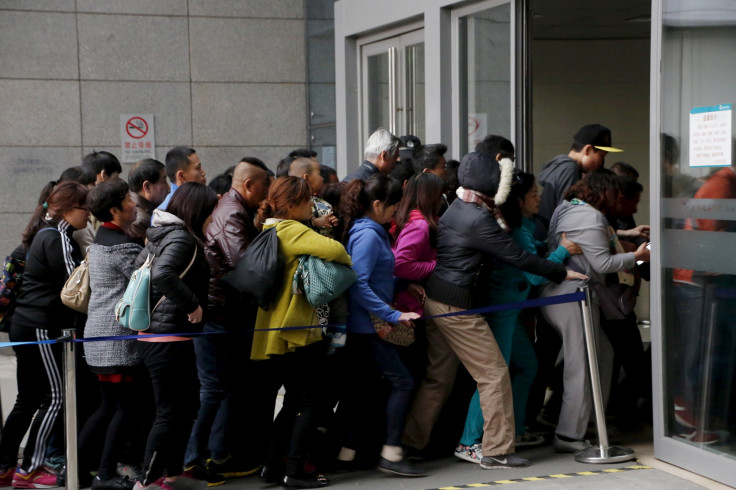China’s ‘backdoor mentality’ has led to a scalping epidemic

Ticket scalpers have been a nuisance in China’s big cities since the 1980’s. Referring to the practice of reselling tickets (or shares) for a quick profit, scalping is illegal in China, yet scalpers are easily spotted at sporting events, theatre performances and even train stations in Shanghai and Beijing.
Just last week, scalpers demanded sky-high prices for Shanghai Disney Resort’s opening day tickets. Standard prices were officially going at 499 yuan (AU$77) for peak times and 70 yuan ($370) for other periods, but scalpers on Taobao, one of Alibaba’s online shopping platforms, jacked up ticket prices as much as ten-fold.
But no scalpers are despised more in the country than those re-selling tickets for hospital visits. Most hospitals in China issue tickets to patients to determine the order in which they are seen for non-emergency treatments. These tickets,often sold for a fee, aim to prevent disorder and queue-cutting when hordes of people simultaneously seek medical attention. However this system seems to have backfired, as it enables scalpers to buy up all the tickets for hospital visits, and re-sell them to desperate patients for obscenely high prices.
In January a video showing a furious young woman denouncing scalpers outside Beijing’s Guang’anmen Hospital went viral on the Chinese microblogging website Weibo. In the video the woman, who is unidentified, said that scalpers wanted 4,500 yuan ($685) for a ticket worth only 300 yuan ($45).

She also talks about trying for two days to get a registration ticket so that her paralysed mother could see a doctor, but to no avail. The woman finally took her ill mother home, and according to Beijing Youth Daily, began receiving threatening phone calls from scalpers after the video was aired.
Despite facing threats, the woman’s public outcry rallied support from thousands of fellow frustrated Chinese citizens who flooded social media with posts expressing anger at scalpers and their unethical tactics. This eventually led to Chinese authorities pledging to look into the issue.
Police have been cracking down and detaining scalpers in Beijing and Shanghai in recent months, bringing to light some heinous crimes. For instance on January 29 security guards at Shanghai’s Ruijin Hospital were caught red-handed accepting bribes from scalpers. In Beijing, approximately 240 scalpers have been arrested this year alone.
However Chinese police officer Feng Jianqi recently told Reuters that it’s not realistic to completely eradicate scalpers as it’s just too difficult a task.
But why exactly do scalpers have the upper hand in this economic power-play?
China’s bigger cities like Beijing and Shanghai are vastly overpopulated, which means everything on offer in these cities -- from doctors to theme-park tickets -- is in short supply, which of course drives up prices. With over 24 million people living in Shanghai, scarcity has created a thriving micro-economy for scalpers. Adding fuel to the fire is the stream of Chinese rural-folk who frequently venture to China’s major cities in hopes of better quality goods and services.
There is also a demand for scalpers amidst China’s wealthy. Last year, China recorded over one million high net worth individuals (HNWI) -- people with investable assets over RMB 10 million ($1.6 million). Many of these super-rich made their fortune in information technology, biotechnology and alternative energy, with a whopping 80 percent under the age of 50.
According to Caixin Media most of these rich people would rather pay somebody to stand in line for them, so they can get on with their busy schedules. And while it might be time-consuming for scalpers to wait in line ahead of everyone else, the work brings in a lucrative sum with minimal effort, making it an appealing ‘career’ for many migrants and the uneducated from other provinces.
The scalping trade also thrives on Chinese residents’ age-old fixation on short cuts, even when it comes to mundane tasks, a Shanghai Daily journalist pointed out.
“The mentality is like this: why should someone enter through the front door when they can pull a few strings and get in through an unofficial channel?” journalist Doug Young explained.
In fact, scalping has become so pervasive that it’s almost expected that there will be a ‘back-door’ entry to an event.
“I once wanted to go watch the Lion King but there were no tickets left. Yet we still went there since we were sure that people would be standing outside reselling tickets,” 20-year-old Serena Dong, a native of Shanghai, told IBTimes Australia.
But the issue of insidious scalping in China really only sheds light on the magnitude of Chinese President Xi Jinping’s challenges: He’s got to find a way to overhaul a creaking, corrupt and underfunded public health system to fulfil a promise of affordable and accessible healthcare to all.





















